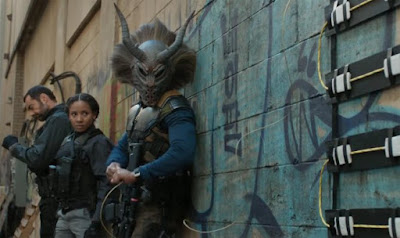Black Panther
When Thor: Ragnarok released a few months ago, the world exclaimed a massive sigh of relief, as it seemed as if the Marvel Comic Book Universe (MCU) was finally entering an upward trend. Not only was Ragnarok a welcome departure from the go-to Marvel movie tone and plot structure, but it was exciting, clever and felt fresh.
Although the success of Ragnarok was exciting, it did, however, paint a massive target on the back of the MCU movie that would follow it - would Black Panther falter along with so many MCU films before it, or rather, continue Ragnarok’s promising upward trend for MCU? The quick and easy answer is that Black Panther not only exceeds its noticeably hyped-up expectations but boldly confronted a very real, very sensitive central theme in a surprisingly considerate and creative manner.
Except for a very short cameo in one of the Captain America films, the Black Panther story arc remained completely untouched and unexplored before Black Panther’s release. Although this meant that the film couldn’t rely on the legacy or credibility of previous direct prequels, it did allow director Ryan Coogler (Creed, Fruitvale Station) to not be bogged down by the responsibility of linking and connecting his plot with the rest of the now highly convoluted Marvel Universe. And this really does show in the final finished product – the plot is fast-paced and never becomes unnecessarily intricate. Best of all, there are no characters that feel like mere unashamed product placements for other films, a crime many recent MCU films are guilty of.
 |
| Black Panther's costume design is one of the standout aspects of the film. |
The impact of being able to utilise unexplored MCU material also positively influences the degree to which Black Panther’s cast can imbue the film with an intriguing sense of originality. For the most part, there are no cookie cutter character archetypes here, which makes getting to know the cast through the course of the film a true joy. Ironically enough (and perhaps this was intentional as a form of clever social commentary), but the only characters that do come over as slightly stereotypical are the non-black lead roles. It’s actually quite hard to single out one specific actor, but it’s worth highlighting Chadwick Boseman’s role as the main protagonist, Winston Duke, Angela Basset and Daniel Kaluuya. The cast does such an amazing job in highlighting the validity of their various agendas that the lines between good and evil become murky very quickly. There is also a commendable degree of character development on display here, with certain characters showcasing more personal growth during the course of this one single film than some Marvel characters do over the course of a whole lineage of Marvel movies.
"...his respect and appreciation for African culture is clearly visible, resulting in a film that truly embodies the principles of Afrofuturism."
Coogler has also done a great job to not abuse the highly African inspired setting and cultural inspiration of his source material – his respect and appreciation for African culture is clearly visible, resulting in a film that truly embodies the principles of Afrofuturism. Some amazing CGI effects and painstakingly detailed costume work helps create a vision of an African-led future that is completely dazzling. Wakanda is the perfect marriage of new world technology and African tradition – audiences are sure to enjoy the journey of discovering this fictional land’s many wonders and surprises.
Another one of the film’s many successes are the highly thrilling and imaginative action sequences. Once again, Coogler uses the combination of African tribal traditions and futuristic technology to the film’s advantage, resulting in fight scenes that will leave your jaw on the floor. There’s also enough variety in terms of the types of confrontations that take place to fill up 2 whole Marvel movies. I saw this film in 4DX and believe me when I say that experiencing the film’s mesmerising action sequences in this format is totally mind-blowing.
But what stands out probably most about Black Panther is its highly ambitious and ballsy overall theme (which I’m not going to give away here). It’s not that Marvel movies haven’t ever before included any direct social or political commentary, but more that a Marvel movie has never addressed such a sensitive societal topic in such a direct way. Kudos goes to Coogler for addressing this highly relevant central theme in a way that showcases the complexities thereof, without allowing it to impede on the overall pace and plot of the film.
 |
| Armoured rhinos? Yes! Yes! Yes! |
Black Panther is one of those rare action films that nimbly side steps each and every genre trope and stereotype that currently plagues the genre. Add to this the fact that it’s a highly polished, well rounded and surprisingly poignant film and it shouldn’t be hard to comprehend why Black Panther confidently towers over almost every other MCU film that has come before it. Ryan Coogler and his team have set a new standard for superhero films and I actually feel sorry for the Marvel (or DC) movie that has to follow this genre-disrupting cinematic masterpiece.
Highlight: Let’s just say that the climactic final battle resulted in multiple and continuous ‘nerdgasms’ for me.



Comments
Post a Comment
Please feel free to ridicule this extremely bias review of mine as you see fit: